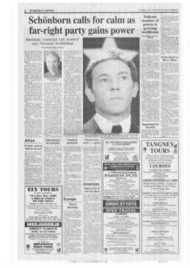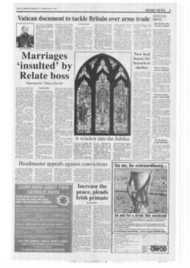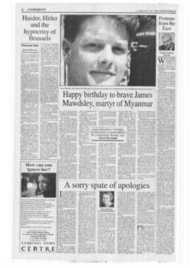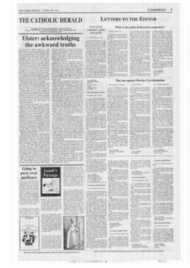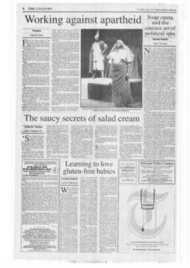Page 6, 11th February 2000
Page 6

Report an error
Noticed an error on this page?If you've noticed an error in this article please click here to report it.
Tags
Share
Related articles
Vigil For Mawdsley, Burma's Martyr
Campaign To Free Mawdsley Gathers Fresh Momentum
Mawdsley Broke His Own Nose, Says Burma's Ambassador
`in 10 Years All Karen Will Be Dead'
Three Words For The Government Of Burma: Free James Mawdsley
Jailed Catholic Threatens To Break Out Of Prison
Happy birthday to brave James Mawdsley, martyr of Myanmar
IT IS AN INTERESTING human trait that we only seem to focus on suffering in the world when we realise that it affects one of our own kind.
The Karen people and other ethnic minorities in Burma have experienced routine cruelty, rape and murder for more than 40 years while the West has remained largely uninvolved. It has taken the imprisonment of one of our own before national attention and conscience has been galvanised.
James Mawdsley has modelled a different example of concern and compassion. He is the only British national detained in Burma.
His protest is an act of solidarity with the ethnic minorities there who he considers to be his brothers and sisters. His arrest, trial and sentencing took place in one day as he defiantly confronted the military authorities with their despicable human rights records.
The authorities, in an effort to break his resolve. are at pains to emphasise that James will serve out the full length of his 17-year sentence.
James' pre-meditated actions, in full knowledge of the consequences, were motivated by what he had heard about the suffering of the Karen people which were so horrific he felt compelled to do all he could at any personal cost. He made clear before he last left England that he wanted simply to highlight the atrocities in Burma.
While there are some who question the effectiveness of his strategy, he remains convinced that, for him, there was no alternative.
"Maybe I cannot convince you that my protest was worthwhile," he wrote in his journal, Real Freedom.
"But the Karen soldiers who fillibd their lives guiding me' for two weeks through the frontline thought it was worth it. And the scores of Burmese I have met since hold no doubt to its value.
"Even the military junta, by its brutal and ridiculous overreaction, confirmed its impact. I am glad that there is consensus, at least among those who understand Burma."
It is a fact that the real importance of his sacrifice lies in the exposure he brings to the enormity of the human suffering in Burma.
The sobering and harsh reality is that more than 30,000 Karen people alone have been killed in the last five years and more than 300,000 have been forced from their homes.
Many thousands hide in the jungle, with little food, and are shot dead on sight when discovered by Burmese soldiers. This is genocide. pure and simple, but like so many historic crimes against humanity, the response of the global
community has been slow and
Words are insufficient to describe the full horror of what is happening or the feelings of the victims and their families, whether it was the Karen couple who watched helplessly as their children were burnt to death by troops, or the Karen woman who was made to eat her baby's heart before she was raped and murdered by soldiers. These are not just isolated atrocities. Indeed, they happen frequently.
A report from the Karen Human Rights Group includes this account from Maung Sein, who described how the military tortured his sister and left her for dead.
"They captured her, tied her up with rope and then beat her head until her head was broken. They were beating her with a gun butt, but she wouldn't die so they slashed her with a knife. They cut off her ears. They slashed her chin and her face and left her to die, but she still didn't die." Similar events, which so deeply stirred James, are United Nations Special Rapporteur on Burma, Rajsoomer Lallah QC, who wrote: 'These violations have been so numerous and consistent over the past years as to suggest that they are not simply isolated Or the acts of individual misbehaviour by middle and lower rank officers but are rather the result of policy at the highest level entailing political and legal responsibility."
Such first-hand accounts of the plight of the Karen must remind us that we have a moral duty, as Christians committed to universal human rights, to honour the stand taken by James.
It is on this same basis that a campaign for the Karen has been run for two years by the Jubilee Campaign. We are now planning a protest to coincide with James' birthday on February 14. It aims to raise awareness of the continuing genocide in Burma and to rally action to put pressure on the Burmese and British government to bring change.
James' demands are outlined in an alternative Valentine's card that has been produced by Jubilee Campaign and is meant to be sent by the sackful to Foreign Secretary
Robin Cook so that he gets the
crucial message.
The family ofJames Mawdsley, representatives of the Karen people and other dignitaries will gather outside the Burmese Embassy at 2pm on February 14. A large giftwrapped bamboo cell will be set up outside, alongside a banner calling for an end to the slaughter. All are welcome to attend the event and to add their voices to his campaign.
Naturally, James' family are in total solidarity with him. They recognise that dins sacrifice serves only to publicise his own sufferings then it would be futile. If, however, his protest can challenge the world to act against this genocide and ensure the triumph of democracy in Burma, then surely it will have immeasurable worth.
This is why he has refused to appeal against his unjust sentence, instead turning to the Bible and relying on his unyielding belief in justice to sustain and inspire him throughout his heroic ordeal.
The least we can do is to offer our support, even if it conies amid the warmth and security of our homes, and the safety of our streets.
Mark Rowland is campaign manager of the Jubilee Campaign
blog comments powered by Disqus



